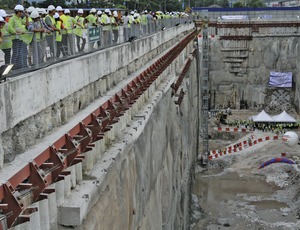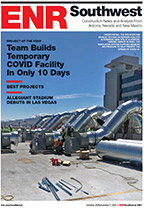
A new type of tunnel-boring machine designed to excavate through fissured limestone recently made its global debut with a breakthrough on Kuala Lumpur's emerging mass rapid-transit system. Six new variable-density-slurry tunnel-boring machines (VDTBM) are deployed on the 9.5-kilometer-long twin drives of the Malaysian capital's notoriously difficult karstic ground.
With the first VDTBM drives completed this January, the technology "is an unqualified success," reports Gus Klados, project manager with the joint venture of locally based MMC Corp. Bhd. and Gamuda Bhd. "We stopped several major slurry leaks to karst fissures and to nearby excavation pits of other developers," Klados adds.
The tunnels form the central section of the mass transit system's 51-km Sungai Buloch-Kajang line. Ground conditions in the tunnel change from karstic limestone in the east to more homogeneous, soft Kenny Hill formation in the west.
The limestone is structurally stable but has fractures that carry groundwater, explains David Parks, chief supervising engineer with London-based Mott MacDonald Group. Mott is handling design for MMC-Gamuda of tunnels and three stations in the karstic stretch.
"The challenge is how to deal with the karst and get the permanent structure safely into the ground," adds Parks.
Klados faced similar challenges when he managed construction for the same contractors on Kuala Lumpur's 9.7-km-long Stormwater Management and Road Tunnel (ENR 4/25/07 p. 26). The SMART tunnel project, which also included a 3-km highway, became operational in mid-2007. TBMs on that project "suffered extensive slurry loss in the fissures," recalls Klados.
Klados' team and the German maker of the SMART project machines— Herrenknecht A.G., Schwanau—went on to develop the VDTBM system. "The machine can operate either in pure slurry mode or in earth-pressure-balance [EPB] mode, with a short conversion time of less than a week," notes Klados.
Also, the operator can change slurry density up to 1.6 tonnes per cu meter from "the normal" 1.1 tonnes per cu m by adding solids to the mix, he adds.
Increasing the density reduces the risk of a blowout from the cutter head, explains Parks. That feature also helps to avoid the creation of sinkholes, which were a common problem in previous Kuala Lumpur tunnels, he adds.
MMC-Gamuda secured its $2.5- billion fixed-price, design-build contract from the Mass Rapid Transit Corp. in March 2012. Its contract covers all civil, building, mechanical and electrical work and fit-out for the underground section, including seven stations. The joint venture is also the owner's project- delivery partner for elevated sections and system-wide contracts.




Post a comment to this article
Report Abusive Comment